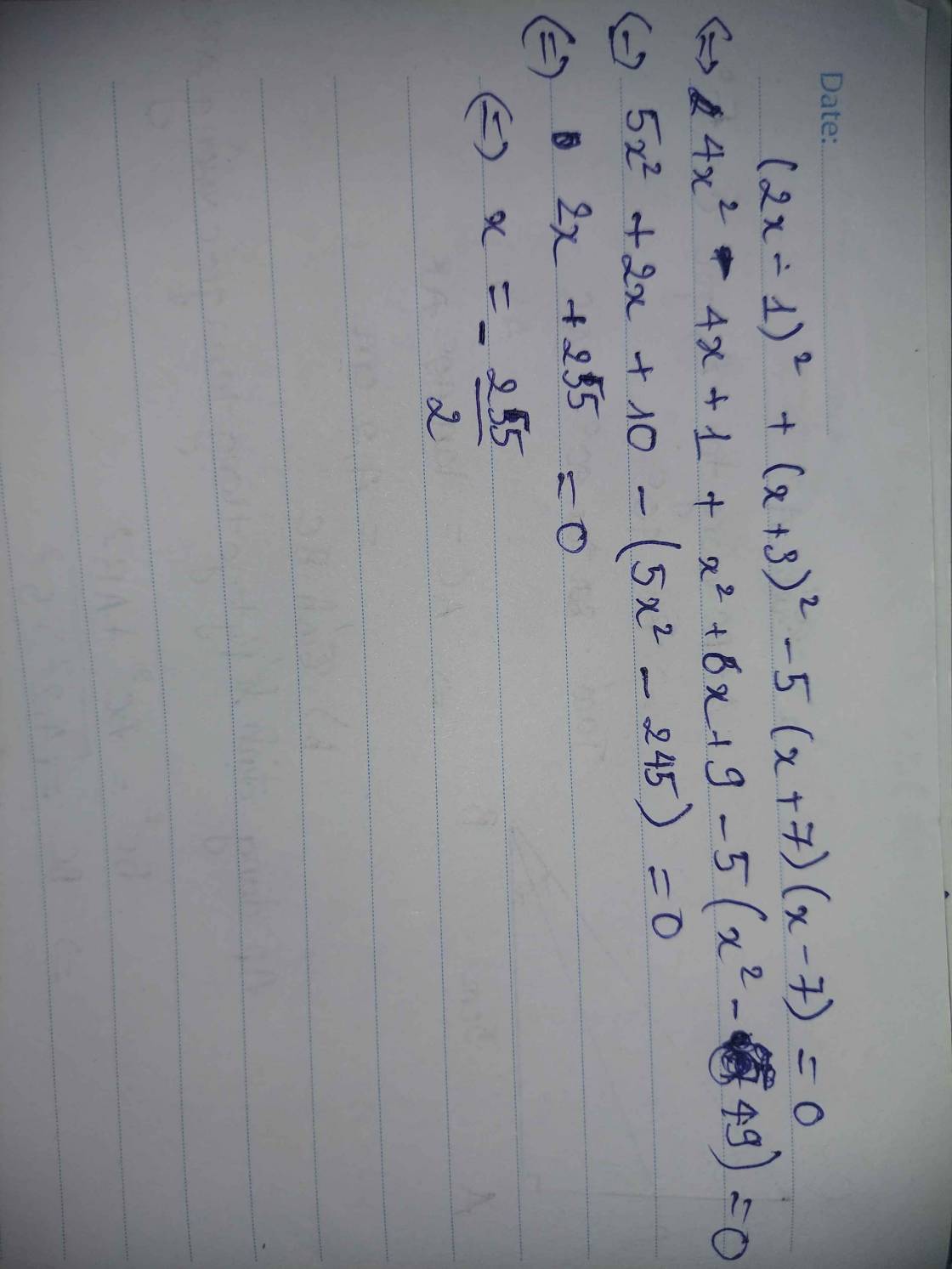

Hãy nhập câu hỏi của bạn vào đây, nếu là tài khoản VIP, bạn sẽ được ưu tiên trả lời.



a,\((x+4)^2-(x+1)(x-1)=16\)
\(\Rightarrow x^2+8x+16-x^2+1=16\)
\(\Rightarrow 8x=-1\Rightarrow x=-\dfrac{1}{8}\)
b,\((2x-1)^2-(x+3)^2-5(x+7)(x-7)=0\)
\(\Rightarrow 4x^2-4x+1-(x^2+6x+9)-5(x^2-49)=0\)
\(\Rightarrow 4x^2-4x+1-x^2-6x-9-5x^2-245=0\)
\(\Rightarrow -x^2-10x-244=0\)
\(\Rightarrow -(x^2-10x+25)-219=0\)
\(\Rightarrow -(x-5)^2-219=0\)
\(\Rightarrow (x-5)^2+219=0\)
Mà \((x-5)^2+219>0\) suy ra PT vô nghiệm

a) \(25x^2-9=0\)
\(\Leftrightarrow\left(5x\right)^2-3^2=0\)
\(\Leftrightarrow\left(5x+3\right)\left(5x-3\right)=0\)
\(\Leftrightarrow\orbr{\begin{cases}5x-3=0\\5x+3=0\end{cases}}\Leftrightarrow\orbr{\begin{cases}x=\frac{3}{5}\\x=-\frac{3}{5}\end{cases}}\)
Vậy \(S=\left\{\frac{3}{5};\frac{-3}{5}\right\}\)
b) \(\left(x+4\right)^2-\left(x+1\right)\left(x-1\right)=16\)
\(\Leftrightarrow\left(x^2+8x+16\right)-\left(x^2-1\right)=16\)
\(\Leftrightarrow x^2+8x+16-x^2+1=16\)
\(\Leftrightarrow8x+17=16\)
\(\Leftrightarrow8x=-1\)
\(\Leftrightarrow x=-\frac{1}{8}\)
Vậy.........
c)\(\left(2x-1\right)^2+\left(x+3\right)^2-5\left(x+7\right)\left(x-7\right)=0\)
\(\Leftrightarrow\left(4x^2-4x+1\right)+\left(x^2+6x+9\right)-5\left(x^2-49\right)=0\)
\(\Leftrightarrow4x^2-4x+1+x^2+6x+9-5x^2+245=0\)
\(\Leftrightarrow2x=-255\)
\(\Leftrightarrow x=-127,5\)
Vậy.............
có j sai xót mong m.n bỏ qua☺
a) \(25x^2-9=0\)
<=> \(\left(5x\right)^2=9\)
<=> \(\left(5x\right)^2=3^2\)
<=> \(5x=3\)
<=> \(x=\frac{3}{5}\)
b) \(\left(x+4\right)^2-\left(x-1\right)\left(x+1\right)=16\)
<=> \(x^2+2.x.4+4^2-\left(x^2-1^2\right)=16\)
<=> \(x^2+8x+16-x^2+1=16\)
<=> \(\left(x^2-x^2\right)+8x+\left(16+1\right)=16\)
<=> \(8x+17=16\)
<=> \(8x=-1\)
<=> \(x=\frac{-1}{8}\)
c) \(\left(2x-1\right)^2+\left(x+3\right)^2-5\left(x+7\right)\left(x-7\right)=0\)
<=> \(\left(2x\right)^2-2.2x.1+1^2+x^2+2.x.3+3^2-5\left(x^2-7^2\right)=0\)
<=> \(4x^2-4x+1+x^2+6x+9-5x^2+5.7^2=0\)
<=> \(\left(4x^2+x^2-5x^2\right)-\left(4x-6x\right)+\left(1+9+5.7^2\right)=0\)
<=> \(2x+245=0\)
<=> \(2x=-245\)
<=> \(x=\frac{-245}{2}\)

Bài 3:
a) \(\left(x-6\right).\left(2x-5\right).\left(3x+9\right)=0\)
\(\Leftrightarrow\left(x-6\right).\left(2x-5\right).3.\left(x+3\right)=0\)
Vì \(3\ne0.\)
\(\Leftrightarrow\left[{}\begin{matrix}x-6=0\\2x-5=0\\x+3=0\end{matrix}\right.\Leftrightarrow\left[{}\begin{matrix}x=6\\2x=5\\x=-3\end{matrix}\right.\Leftrightarrow\left[{}\begin{matrix}x=6\\x=\frac{5}{2}\\x=-3\end{matrix}\right.\)
Vậy phương trình có tập hợp nghiệm là: \(S=\left\{6;\frac{5}{2};-3\right\}.\)
b) \(2x.\left(x-3\right)+5.\left(x-3\right)=0\)
\(\Leftrightarrow\left(x-3\right).\left(2x+5\right)=0\)
\(\Leftrightarrow\left[{}\begin{matrix}x-3=0\\2x+5=0\end{matrix}\right.\Leftrightarrow\left[{}\begin{matrix}x=3\\2x=-5\end{matrix}\right.\Leftrightarrow\left[{}\begin{matrix}x=3\\x=-\frac{5}{2}\end{matrix}\right.\)
Vậy phương trình có tập hợp nghiệm là: \(S=\left\{3;-\frac{5}{2}\right\}.\)
c) \(\left(x^2-4\right)-\left(x-2\right).\left(3-2x\right)=0\)
\(\Leftrightarrow\left(x^2-2^2\right)-\left(x-2\right).\left(3-2x\right)=0\)
\(\Leftrightarrow\left(x-2\right).\left(x+2\right)-\left(x-2\right).\left(3-2x\right)=0\)
\(\Leftrightarrow\left(x-2\right).\left(x+2-3+2x\right)=0\)
\(\Leftrightarrow\left(x-2\right).\left(3x-1\right)=0\)
\(\Leftrightarrow\left[{}\begin{matrix}x-2=0\\3x-1=0\end{matrix}\right.\Leftrightarrow\left[{}\begin{matrix}x=2\\3x=1\end{matrix}\right.\Leftrightarrow\left[{}\begin{matrix}x=2\\x=\frac{1}{3}\end{matrix}\right.\)
Vậy phương trình có tập hợp nghiệm là: \(S=\left\{2;\frac{1}{3}\right\}.\)
Chúc bạn học tốt!

ANH HAY CHỊ ƠI LÀM GIÚP EM BAI LỚP 7 ĐI O DUOI DAY A
a) \(\left(x-3\right)^2-4=0\)
\(\Rightarrow\left(x-3\right)^2=4\)
\(\Rightarrow\left(x-3\right)^2=2^2=\left(-2\right)^2\)
\(\Rightarrow x-3=2\)hoặc \(\left(x-3\right)=-2\)
\(\Rightarrow\hept{\begin{cases}x-3=2\\x-3=-2\end{cases}\Rightarrow\hept{\begin{cases}x=5\\x=-1\end{cases}}}\)
Vậy \(x\in\left\{5;-1\right\}\)
b) \(x^2-2x=24\)
\(\Rightarrow x.\left(x+2\right)=24\)
\(\Rightarrow x.\left(x+2\right)=4.6\)
\(\Rightarrow x=4\)
Vậy \(x=4\)

a) \(4x^2-12x=-9\)
\(\Leftrightarrow4x^2-12x+9=0\)
\(\Leftrightarrow\left(2x-3\right)^2=0\)
\(\Leftrightarrow2x-3=0\Leftrightarrow x=\frac{3}{2}\)
b) \(\left(5-2x\right)\left(2x+7\right)=4x^2-25\)
\(\Leftrightarrow\left(5-2x\right)\left(2x+7\right)+\left(25-4x^2\right)=0\)
\(\Leftrightarrow\left(5-2x\right)\left(2x+7\right)+\left(5-2x\right)\left(5+2x\right)=0\)
\(\Leftrightarrow\left(5-2x\right)\left(2x+7+5+2x\right)=0\)
\(\Leftrightarrow\left(5-2x\right)\left(4x+12\right)=0\)
\(\Leftrightarrow\left[\begin{array}{nghiempt}x=\frac{5}{2}\\x=-3\end{array}\right.\)
c)\(x^3+27+\left(x+3\right)\left(x-9\right)=0\)
\(\Leftrightarrow\left(x+3\right)\left(x^2-3x+9\right)+\left(x+3\right)\left(x-9\right)=0\)
\(\Leftrightarrow\left(x+3\right)\left(x^2-3x+9+x-9\right)=0\)
\(\Leftrightarrow\left(x+3\right)\left(x^2-2x\right)=0\)
\(\Leftrightarrow\left(x+3\right)x\left(x-2\right)=0\)
\(\Leftrightarrow\left[\begin{array}{nghiempt}x=-3\\x=0\\x=2\end{array}\right.\)
d) \(4\left(2x+7\right)^2-9\left(x+3\right)^2=0\)
\(\Leftrightarrow\left[2\left(2x+7\right)-3\left(x+3\right)\right]\left[2\left(2x+7\right)+3\left(x+3\right)\right]=0\)
\(\Leftrightarrow\left(4x+14-3x-9\right)\left(4x+14+3x+9\right)=0\)
\(\Leftrightarrow\left(x+5\right)\left(7x+23\right)=0\)
\(\Leftrightarrow\left[\begin{array}{nghiempt}x=-5\\x=-\frac{23}{17}\end{array}\right.\)

a, \(\left(2x-3\right)^2-4=0\)
<=> \(\left(2x-3\right)^2=4\)
<=> \(\left[{}\begin{matrix}2x-3=2\\2x-3=-2\end{matrix}\right.\Leftrightarrow\left[{}\begin{matrix}x=\dfrac{5}{2}\\x=\dfrac{1}{2}\end{matrix}\right.\)
Vậy......
b, \(x^2-2x=0\)
\(\Leftrightarrow x\left(x-2\right)=0\Leftrightarrow\left[{}\begin{matrix}x=0\\x-2=0\Rightarrow x=2\end{matrix}\right.\)
Vậy............
c, \(\left(2x-1\right)^2+\left(x+3\right)^2-5\left(x+7\right)\left(x-7\right)=0\)
\(\Leftrightarrow4x^2-4x+1+x^2+6x+9-5x^2+245=0\)
\(\Leftrightarrow2x=-255\Leftrightarrow x=-\dfrac{255}{2}\)
Vậy.......

a, \(\left(x+4\right)^2-\left(x+1\right)\left(x-1\right)=16\)
\(\Leftrightarrow x^2+8x+16-\left(x^2-x+x-1\right)=16\)
\(\Leftrightarrow8x+1=0\Leftrightarrow x=-\frac{1}{8}\)
b, \(\left(2x-1\right)^2+\left(x+3\right)^2-5\left(x+7\right)\left(x-7\right)=0\)
\(\Leftrightarrow4x^2-4x+1+x^2+6x+9-5\left(x^2-49\right)=0\)
\(\Leftrightarrow2x+255=0\Leftrightarrow x=-\frac{225}{2}\)
c, \(\left(x+2\right)\left(x-2\right)-x^3-2x=15\)
\(\Leftrightarrow x^2-4-x^3-2x=15\)( vô nghiệm )
d, \(\left(x+3\right)^3-x\left(3x+1\right)^2+\left(2x+1\right)\left(4x^2-2x+1\right)=28\)
\(\Leftrightarrow x^3+9x^2+27x+27-9x^3+6x^2-x+8x^3+1=28\)
\(\Leftrightarrow15x^2+26=0\Leftrightarrow x^2\ne-\frac{26}{15}\)( vô nghiệm )
Tính nhẩm hết á, sai bỏ quá nhá, sắp đi hc ... nên chất lượng hơi kém xíu ~~~

a) \(\left(x+1\right)\left(2x-1\right)\left(-x+2\right)=0\)
\(\Leftrightarrow\left[\begin{matrix}x+1=0\\2x-1=0\\-x+2=0\end{matrix}\right.\Leftrightarrow\left[\begin{matrix}x=-1\\x=\frac{1}{2}\\x=2\end{matrix}\right.\)
Vậy phương trình có tập nghiệm là \(S=\left\{-1;\frac{1}{2};2\right\}\)
b) \(\left(2x-1\right)\left(3x+2\right)\left(4x-5\right)\left(x-7\right)=0\)
\(\Leftrightarrow\left[\begin{matrix}2x-1=0\\3x+2=0\\4x-5=0\\x-7=0\end{matrix}\right.\Leftrightarrow\left[\begin{matrix}x=\frac{1}{2}\\x=-\frac{2}{3}\\x=\frac{5}{4}\\x=7\end{matrix}\right.\)
Vậy phương trình có tập nghiệm là \(S=\left\{\frac{1}{2};-\frac{2}{3};\frac{5}{4};7\right\}\)
c) \(x^2-6x+11=0\)
\(\Leftrightarrow x^2-6x+9+2=0\)
\(\Leftrightarrow\left(x-3\right)^2+2=0\) (vô lí)
Vậy phương trình vô nghiệm
d) \(\left(x^2+2x+3\right)\left(x^2-25\right)\left(x+19\right)=0\)
\(\Leftrightarrow\left(x^2+2x+1+2\right)\left(x+5\right)\left(x-5\right)\left(x+19\right)=0\)
\(\Leftrightarrow\left[\left(x+1\right)^2+2\right]\left(x+5\right)\left(x-5\right)\left(x+19\right)=0\)
\(\Leftrightarrow\left[\begin{matrix}x+5=0\\x-5=0\\x+19=0\end{matrix}\right.\Leftrightarrow\left[\begin{matrix}x=-5\\x=5\\x=-19\end{matrix}\right.\)
Vậy phương trình có tập nghiệm là \(S=\left\{\pm5;-19\right\}\)
a,b,d dễ mà bạn tự làm
c,x2-6x+11=0<=> x2-6x+9+2=0
<=>(x-3)2=-2(vô lý)
vậy pt vô nghiệm

1: =>2x-5=4 hoặc 2x-5=-4
=>2x=9 hoặc 2x=1
=>x=9/2hoặc x=1/2
2: \(\Leftrightarrow\left|2x+1\right|=\dfrac{3}{4}-\dfrac{7}{8}=\dfrac{-1}{8}\)(vô lý)
3: \(\Leftrightarrow\left|5x-3\right|=x+5\)
\(\Leftrightarrow\left\{{}\begin{matrix}x>=-5\\\left(5x-3-x-5\right)\left(5x-3+x+5\right)=0\end{matrix}\right.\)
\(\Leftrightarrow\left\{{}\begin{matrix}x>=-5\\\left(4x-8\right)\left(6x+2\right)=0\end{matrix}\right.\Leftrightarrow x\in\left\{2;-\dfrac{1}{3}\right\}\)